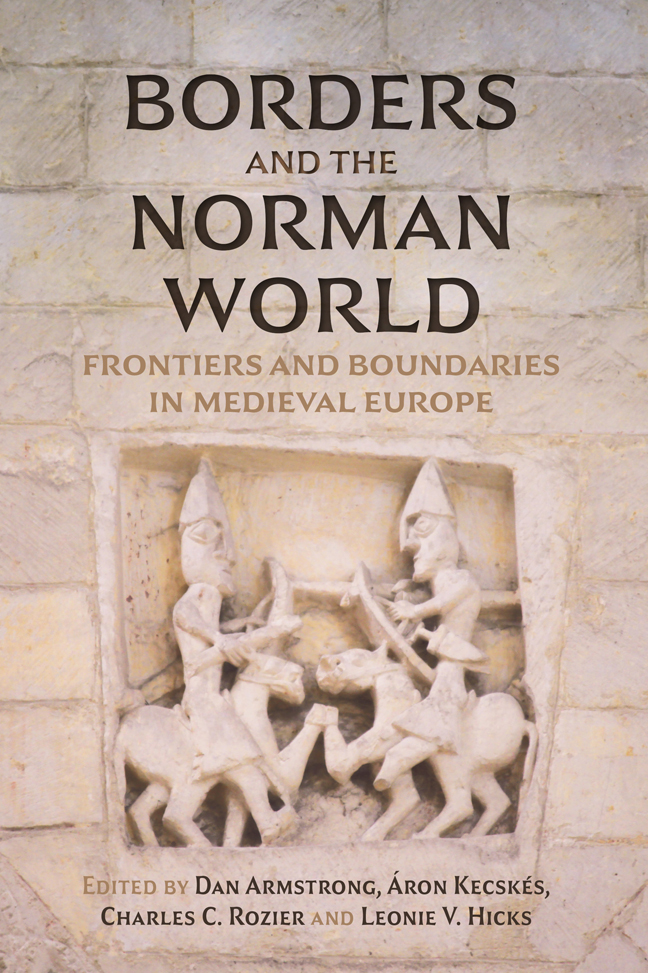Book contents
- Frontmatter
- Contents
- List of Illustrations
- List of Contributors
- Acknowledgements
- List of Abbreviations
- Naming Conventions
- Maps
- Introduction: Writing the Borders of the Norman World
- Part I Borders in and Around the Norman World
- Part II Ecclesiastical Borders
- Part III Conceptual Boundaries
- Afterword: Borders, Landscapes, and Seascapes
- Select Bibliography
- Index
2 - The Northern Limits of Norman Power: Border Policies in Northumbria, c. 1050–1100
Published online by Cambridge University Press: 22 February 2024
- Frontmatter
- Contents
- List of Illustrations
- List of Contributors
- Acknowledgements
- List of Abbreviations
- Naming Conventions
- Maps
- Introduction: Writing the Borders of the Norman World
- Part I Borders in and Around the Norman World
- Part II Ecclesiastical Borders
- Part III Conceptual Boundaries
- Afterword: Borders, Landscapes, and Seascapes
- Select Bibliography
- Index
Summary
Duke William of Normandy's victory at the Battle of Hastings on 14 October 1066 and subsequent assumption of royal power in England extended the northern limits of Norman political power to Northumbria. This northernmost region of England bordered the Scottish kingdom to the north and west, carried a tradition of assumed independence from centralised English rule, hosted some unique institutional frameworks, and, in all, presented the Anglo-Norman kings with one of the most significant challenges to their authority down to the middle of the twelfth century. Nowhere was this seen more clearly than in the northern revolts of 1069–70 against the rule of King William the Conqueror. These fractious months witnessed the death of a Norman-appointed earl and most of his army at Durham and a similar destruction of Norman forces and fortifications at York, and saw realistic threats that both the English claimant, Edgar Ætheling, and the king of Denmark, Svend Estridsen, might gain support in the region in order to challenge William's right to rule England. King William's response to this unrest is usually referred to as his ‘Harrying’ of the northern regions, and has come to dominate the debate on the northern limits of Norman power in Britain before c. 1100. Writing during the twelfth century, the Anglo-Norman chronicler, Orderic Vitalis, described William's actions as follows:
He [William] cut down many in his vengeance; destroyed the lairs of others; harried the land and burned homes to ashes. Nowhere else had William shown such cruelty … he made no effort to restrain his fury and punished the innocent with the guilty. In his anger, he commanded that all crops and herds, chattels and food of every kind should be brought together and burned to ashes with consuming fire, so that the whole region north of the Humber might be stripped of all means of sustenance. In consequence, so serious a scarcity was felt in England and so terrible a famine fell upon the humble and defenceless populace, that more than 100,000 Christian folk of both sexes, young and old alike, perished of hunger.
William's campaign in the aftermath of 1069–70 epitomises his generally hostile approach to the north, which has been described by William Kapelle as ‘Government by Punitive Expedition’, and by William M. Aird as representing a period of ‘sporadic violent revolts, put down by equally ferocious punitive expeditions’.
- Type
- Chapter
- Information
- Borders and the Norman WorldFrontiers and Boundaries in Medieval Europe, pp. 43 - 68Publisher: Boydell & BrewerPrint publication year: 2023



